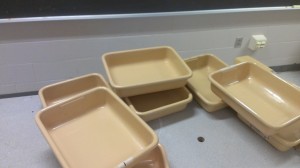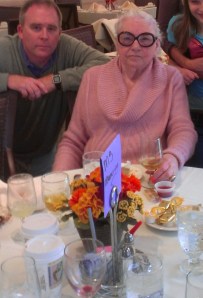I’ve realized maintaining two blogs and teaching full time is an unsustainable effort at this point. If you want to read more of my thoughts on education, I continue to blog at Indystar.com. Here is the link.
Uncategorized
Some things about teaching science are inevitable
Sometime in early 2009, when I was interviewing for a chance to receive a Woodrow Wilson teaching fellowship, I first met Don Meissner, the man who would end up being my mentor through my first three years of teaching.
He was interviewing lots of candidates, working to separate the wheat from the chaff. Among the questions I remember him asking was something like this:
“You’ve been a Marine officer, a high-powered editor (rather than correct this overstatement, I let it slide, the better to avoid becoming chaff) at a big newspaper … do you think you could stand being a science teacher? You’ve got to wash out test tubes and clean beakers….”
I didn’t hesitate to assure him I had no problem cleaning glassware.
So I had to smile as I spent much of this afternoon … cleaning up after a week’s worth of great labs. Cups, droppers, and the ever useful tubs. Along with a good scrubbing of table tops and sinks.
A wage bigger than dollars and cents
As the finish comes in sight, so too does a new beginning
The end of the year is still two weeks off but already my thoughts are shifting to next year.
My visiting scientist has wrapped up her work this year and the geckos have gone to summer with her. Although the lizards did make interesting roommates, they never did reproduce so perhaps a summer under her care with yield better results.
But there’s no easy way to line up a successor. The GK-12 program has shut down.
I did offer to mentor a student teacher through the Woodrow Wilson program that trained me, but the odds of a them having someone interested in middle school sounded long.
More concretely, changes in the schedule mean that I will no longer have a science “elective” course to teach. I had had one nine-week “Excel Science” class all year and the combination of small classes and strong students made it pretty fun to teach.
In return, I will have a section of high-ability students next year. The forecast is for larger class sizes in general, and high ability sections tend large as well – because there is only one and there is often pressure to squeeze in as many students as possible.
So one worry is how to work more than 28 students into class at a time. I have seats for far more than that, but with only seven lab tables and room for four per table, you can see there are limits. One or two groups with a fifth student is manageable but much beyond that gets tough.
Not that I have any numbers yet for next year’s class sizes but it’s the kind of thing that makes you a little anxious over the summer break.
Really the biggest question will be how I will tailor my lessons to challenge my more capable students. As a parent of three talented young girls, I know nothing drives me crazier than teachers who leave my daughters unchallenged and bored.
All in all, things could be tougher: in a massive room shuffle, most of my peers at the middle school are moving rooms over the summer.
Whatever lies ahead, though, for now the focus remains finishing up these next two weeks strong.
A simple departure from expectations
A friend in high school once accused me of being nothing but an overgrown hippie.
The budding punk rocker in me was horrified at the time (and just to be clear, my hair never came close to hippie standards for length).
But in my dotage, I’ve come to accept there may have been some truth in that. Maybe this former Marine has a streak of Peace & Love hidden down deep inside.
Case in point: When my first daughter was born and I at last held her in my hands, I had one thing to say. Right there amid the business-like chatter of the nurses, I knew the first word I wanted this beautiful new creature to hear from me:
Love.
I grew up surrounded by a passion for the power and beauty of words, after all. My mother, a sometime Latin teacher, was a philologist in the purest sense: a lover of words. Her greatest joy seemed to be telling stories, stories that used words to spin laughter or sadness from her listeners. Devouring books and learning to speak other languages were the hallmarks of becoming an adult in my family. As a young child, I stood in awe of my mother’s ability to discuss me with my older siblings in French — leaving me completely frustrated and out of the conversation.
So when I stood beside the bed of my dying mother Friday morning, watching her peacefully slide away as her breathing slowed, I clung to only a single idea. I leaned over and pressed my cheek against hers, my lips just above the glowing red oxygen monitor clipped to her earlobe. I wanted to say one thing, wanted her to hear one word at the last.
Love.
Here comes round 2!
A voice for change
As someone who is (perhaps too) often willing to sit on the sidelines until the dust settles, I have nothing but respect for a long-time friend who is courageously raising plenty of dust all on his own.
As long as he’s been a physician’s assistant, I’ve known Jim Anderson to be working against inequities in health care — he’s the one who first told me that race could affect how much pain medication a doctor prescribes. Seems crazy, but research has shown black folks with the same pain as white folks may not get as much pain medicine.
So I suppose it’s not surprising Jim is leading the push to remove a speaker from his professional organization’s annual conference — famed surgeon Ben Carson. Carson is fresh from loathsome comments at the Conservative Political Action Conference, comments about gays and lesbians Jim feels his group should not support, regardless of the speaker’s politics.
But he can put it better than I can, which he does eloquently over at HuffPo.
Wrapping up Spring Break
Clearing the last major calendar change and I think I can say I like the new balanced academic year.
It meant going back to work before the end of July and will keep me in school into June. But three two-week breaks a year are a definite upside.
My unscientific sense is that students haven’t lost a lot of ground during the time off — though I am curious to see what attitudes are like when we resume classes next week. Now we are just eight weeks from the end of the year, which seems to be the roughest time for 8th graders who long ago began dreaming of high school.
One thing does seem to remain the same, whether your time off comes in chunks of one week or two: not everything you’d hoped gets done.
So while our bathroom has a new showerhead and the sink is draining swiftly again, the garden still remains a post-winter mess and some of my side projects are behind schedule. And, to be honest, I am still not done with the taxes.
Today I’ll stop by school to get some photocopies done and do a little cleaning. The geckos have been with our scientist getting a little extra attention over break. I may put some strawberries in the window boxes ….
And one more benefit to the longer break: today I’ll get to stop by one daughter’s class as they put on their own Wax Museum of American History.
Gecko tensions rise
My students are encountering Punnett Squares today, that useful tool for calculating inheritance probabilities.
And this is about where the geckos were to make their triumphant, egg-laying arrival into the middle of our curriculum.
And while there may be some eggs on the way, so far we have not actually seen any appear.
I guess someone forgot to tell Kamren and Scooter about their role in all this.
We are days away from a two-week spring break, so there is hope. Perhaps by the time we all reconvene in April, the eggs will have arrived.
One student already was suggesting a trip to a vet to evaluate Kamren’s egg-laying efficiency (or lack of it). I suppose there is a possibility of some additional, real-world based learning if there is a reason for the problem although lizard reproduction is not covered in Indiana’s 8th grade science standards.
Revenge of the data
At the risk of sounding petty and vindictive, let me disclose right now that I had at least two moments of unalloyed triumph during parent conferences thanks to my school’s new focus on data.
Meetings with parents this week were to focus on testing data and our efforts to improve scores on the mandatory statewide exams coming up in April. Grades, behavior, plans for high school — all that took a backseat.
To track progress, we have given students other standardized tests — at the start of the school year, last month and once more in the spring. I had the results of those tests to share with parents.
The data showed some students making great strides already this year.
But for a couple, students with an all-too-common mix of ability and apathy, the results showed something else. These teens were earning lower grades than the should, thanks to problems like missing assignments and low test scores. They typical defense is to say the child just didn’t understand the material and the teacher was unwilling to help them. This often brings a stern lecture about the responsibility to ask for help, but that’s a different lecture than parents usually give when a student is not trying their hardest.
Enter the test data, which for these two students showed a drop of 20 points. That’s roughly a tumble of three grade levels from August to January.
It doesn’t take a statistician to see a drop like that probably doesn’t represent a staggering loss of knowledge.
Somebody didn’t try.
All I had to do was present the data.
The parents did all the talking from there.





